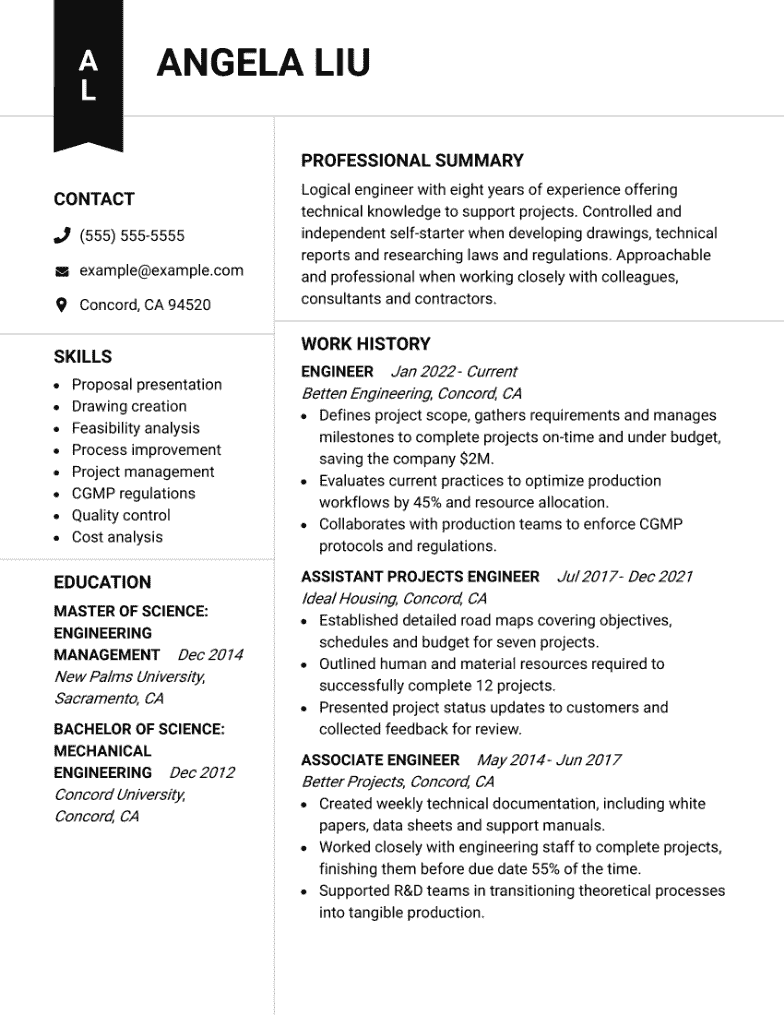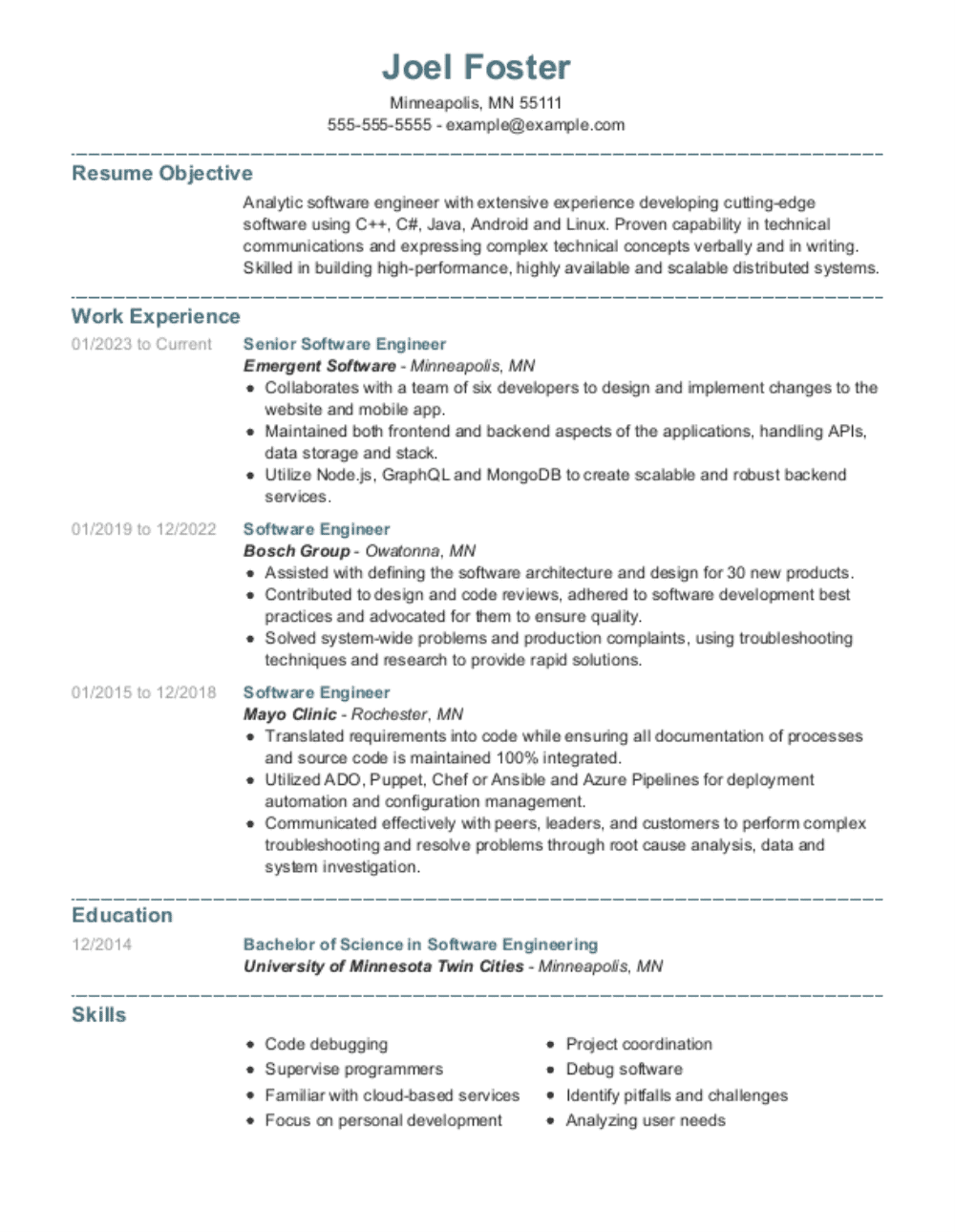We personalize your experience.
We use cookies in our website to ensure we give you the best experience, get to know our users and deliver better marketing. For this purpose, we may share the information collected with third parties. By clicking “Allow cookies” you give us your consent to use all cookies. If you prefer to manage your cookies click on the “Manage cookies” link below.
Use our engineering resume examples as a foundation to learn the specific traits and skills of a strong engineering resume.
Our customers have been hired by*:*Foot Note

Use this visual example to create a well-formatted engineer resume with the correct sections, looks professional and reads well. Looking for another design? We have dozens of professionally-designed resume templates you can choose in our Resume Builder to make a resume in a few minutes.

Engineers are highly trained, incredibly knowledgeable individuals who need a thorough understanding of technical processes to do their jobs well. That means when you’re writing a resume and cover letter for a dream engineering job, you’re competing against other people who also have amazing skills and plenty of education. How do you stand out in a field where even an entry-level job often has many requirements?
On this page, we’ll provide:
A hiring manager often sees the same skills, work history and education over and over again in engineering resumes. If you want to turn heads, energize your resume by focusing on specific technical skills, soft skills and hard skills that the employer is looking for.
A mechanical engineering job listing, for example, might include in their list of essential skills the ability to create design schematics, experience selecting equipment, control philosophy and the preparation of performance sizing calculations.
As a job seeker, the best thing you can do to catch a hiring manager’s attention is to focus on these skills in your resume to show the prospective employer you have what they need.
If you’ve been responsible for a ton of engineering projects over the years, don’t laundry-list them! Instead of focusing too much on everyday responsibilities and projects, highlight successful projects that have been most important to your engineering career.
For example, a software engineer resume might highlight how many teams you have collaborated effectively with to design innovative business information systems or the number of clients you have proposed software designs for. It’s far more impressive to write, “Developed architectural approaches for nine new features and applications,” instead of, “Developed architectural approaches.”
The job of a mechanical engineer isn’t the same as the job of a civil engineer. Read the job description carefully to determine the requirements and responsibilities of the engineering job you want to apply to and create your engineering resume accordingly.
Some employers might value a candidate skilled in AutoCAD and SQL, while others might be searching for someone more knowledgeable in Linux and CSS.
A big part of tailoring your resume to the job is including keywords and key phrases from the job posting in your resume. Select a handful of skills and listed responsibilities from the job description that apply to you and write them in different sections of your resume.
An applicant tracking system (ATS) is a software that most companies use to filter through resumes so only the most qualified applicants make it through. To make sure your resume is ATS-friendly, use keywords and select a resume template that is easy to read. Our templates are designed by experts with ATS software in mind.
See what our customers say about us
Looking at job-specific resume examples will give you an idea of what type of information you can include in your resume. Use this engineer resume sample as a guideline on how to organize your information, relevant skills you can highlight and important technical expertise to add. Look at our additional engineering resume samples (links further below) for even more inspiration.

There are three standard resume formats you can use to create an engineering resume:
In addition to choosing the correct engineering resume format for your level of experience, keep these additional resume formatting tips in mind:
Write your name in the header, along with your phone number and email address. Make sure that the contact information you use is up-to-date and professional (no silly email addresses here). You can also include your LinkedIn social handle if it’s relevant to the job and will provide additional information about your career.
Next, it’s time to summarize your career. You have two options: write a resume summary or write a resume objective.
A resume summary is a two-to-three-sentence paragraph that gives the potential employer an overall picture of your experience and top skills. It’s best for candidates with more than two years of experience in the field. Take a look at this engineering resume summary:
A resume objective is also a short paragraph that provides an overview of your career thus far but also states your career goals. So if you’re writing an entry-level engineering resume or you’re changing careers, you can tell employers what you’re looking for. For example:
Fleshing out your skills section as an engineer is all about highlighting what you’re best at. Use bullet points to write a mix of 8-10 hard skills and soft skills, such as:
Work experience is often very important for engineers and job seekers will frequently have many years of experience when filling out their experience section. Use your engineering resume to highlight past jobs as well as any personal projects or extracurricular activities where you may have gotten experience. This includes volunteer work in engineering-based industries, internships where you’ve had engineering responsibilities and even academic experience and coursework if you’re still in school.
In addition to the tips mentioned above, make the most of your work history section by:
Take a look at this example of an engineering resume work experience entry:
Engineers usually need at least a bachelor’s degree in an engineering discipline in order to get hired, such as aerospace engineering, civil engineering or chemical engineering. A master’s degree may be needed to advance in some fields.
If you’ve finished your college degree, there’s no need to list your high school experience in your education section. Just feature your undergraduate and/or graduate degrees, along with any relevant specialized coursework or awards. Likewise, if you graduated from university more than 10 years ago, you don’t have to include the graduation date in your engineering resume.
Engineers who are accredited by ABET and are licensed can include their license number and additional certifications in this section as well.
Here’s an outline of how to write an entry in your education section:
If you have certifications, awards, publications or have participated in important conferences, you can create additional sections in your resume to highlight these accomplishments. Just make sure they’re relevant to the job and will help establish your engineering expertise.
For example, here’s how you can organize a certifications section in engineering resumes:
ResumeHelp has plenty of other resources, examples of engineering specialties and expert guides for writing a solid resume.
Your engineering job application won’t be complete without a professional cover letter. We have plenty of cover letter writing resources available:
To wrap up, here’s a summary of what we’ve covered in this article:
A cover letter is an important part of a job application, even if it’s not specifically stated in the job description. If you don’t know how to write a cover letter, don’t worry — use the ResumeHelp cover letter builder to create a great letter, with cover letter templates and examples you can use to really boost your experience and accomplishments.
Every time you submit a resume, you should make sure you’re updating it to suit the specific job description you’re submitting it with.
Recruiters write job ads with the ideal candidate in mind, so you should make sure you’ve scanned the job description to find important keywords that showcase the kind of skills and experiences they’re looking for (e.g., “ability to read mechanical drawings” or “experience with product design”).
That way, you can update your engineering resume to meet each individual hiring manager’s needs as much as you can. Keywords that match the wording in the job post will help your resume get past the applicant tracking systems (ATS) employers use to scan resumes.
To write an engineering resume, you should:
Make sure to read the job description carefully and tailor your resume to the job by including key requirements and responsibilities.
Writing a resume with no experience is possible. Here are some expert tips to keep in mind:
An engineering resume objective states your goals of employment in engineering. It’s a two-to-three-sentence paragraph at the top of your resume where you:
For example:
Diligent college student working towards B.A. in software engineering at Nevada University. Looking for engineering internship to build programming experience and hone coding skills. Excellent critical thinking skills, research skills and computer knowledge.
A resume objective is best for job seekers who have less than two years of experience or are changing careers, so if you’re a candidate with more experience under your belt, you might want to consider writing a professional resume summary instead.
Here’s a list of sought-after skills you can include in your engineering resume:
10 soft engineering skills:
10 hardengineering skills:
The goal of a professional summary is to highlight your top engineering skills and professional experience relevant to the job description. A summary should be short (no more than three sentences) and motivate the recruiter or manager to continue reading your resume.
Take a look at this civil engineer resume summary:
Detail-oriented civil engineer with more than six years of experience offering abilities in civil design and project management. Experience reviewing drawings and site work to meet quality, safety and budget goals. Proven track record of monitoring public and private sector agencies to identify and resolve field issues promptly.
For more inspiration, you can check our engineering resume examples for an engineering student or computer engineering.
Make it relevant to the job opening. Instead of creating a single engineer resume and submitting it to every job posting you see, read each job description carefully and tailor your resume to it.
Job postings may vary, even if they’re for the same job title, so show the hiring manager you are the best fit for that specific job by highlighting skills and key responsibilities mentioned in the listing. For example, if the job posting lists “Create and maintain controls and documentation procedures” as one of the job tasks, emphasize work achievements and/or skills in your resume that show you can excel at this task.
Don’t include irrelevant information, such as your first part-time job or your favorite hobbies. Everything you write in your resume should target the job opening and be relevant to it. Otherwise, you’ll be wasting valuable space with information that won’t convince employers to call you for a job interview.
Some other things to not include in your engineering resume:
Couldn't find the answer you're looking for?